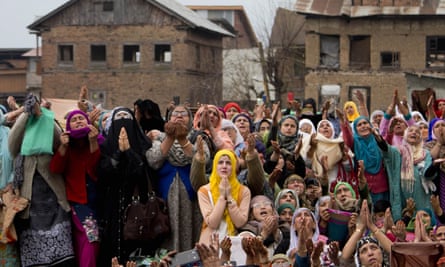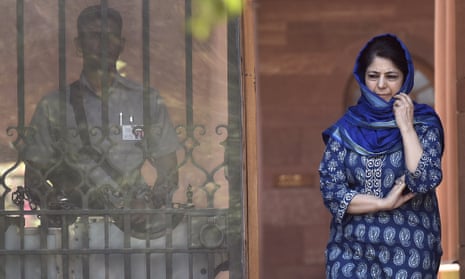One of the first decisions Mehbooba Mufti made during her inaugural cabinet meeting as chief minister of the state of Jammu and Kashmir was to increase the number of police stations designated for women from two to six.
Women across India are daunted by the idea of walking into a police station full of male officers to report a crime, particularly a sexual crime. This means many offences go unreported. As a solution, India now has about 500 police stations staffed exclusively by women. Jammu and Kashmir has only two to support a female population of about 6 million.
After the meeting last week, the first woman to lead the state then met all the female civil servants in the civil secretariat.
“I heard that she said she would work for women. I think she will start a new chapter,” says Shazia Wani, who works in a bakery.
Mufti, 56, took office this month. Being a woman hasn’t hindered her political career, nor has her marital status in a fiercely patriarchal society – she is a divorced Muslim woman and single parent who raised two daughters.
She is a recognisable face across India, emerging as a politician of note in the late 1990s by insisting that Kashmir, after decades of a violent insurgency for a separate state, needed a “healing touch” from politicians.
Rebels have been fighting against Indian rule in the state since 1989. More than 68,000 people have been killed in the uprising and a subsequent Indian military crackdown.
Mufti provided that softer approach by visiting the homes of women who had lost sons, husbands or brothers in the conflict. It was this political persona – a woman from an elite political family who understood the pain of ordinary Kashmiri women – that laid the foundation of her career.
But Mufti has to prove she’s more than “daddy’s daughter”, as some used to call her. Her father was Mufti Mohammad Sayeed, chief minister of the state from the People’s Democratic party (PDP), when he died, in office, on 7 January.
How she handles three key issues will largely determine whether she is successful: her alliance with the Hindu nationalist Bharatiya Janata party (BJP), supporting those displaced by the devastating September 2014 floods, and unemployment.
The unlikely alliance between the PDP and the BJP (which is in power in Delhi) was a bold experiment of her father’s. The BJP draws its support from the Hindu-majority region of Jammu; the PDP from the Muslim majority in Kashmir. They are at opposite extremes. Sayeed called the alliance a meeting between the north and south poles.
Managing the contradictions will not be easy. “Her challenge is to keep the PDP together. Her assessment seems to be that while the PDP is in power, she can at least stop it splitting,” says Seema Mustafa, director of the Centre for Policy Analysis in Delhi.
But for Firdous Shabir, a Srinagar kebab shop owner, Mufti’s priority must be compensating and rehabilitating families who lost their homes, shops and businesses in the floods in 2014. The length of time this has taken is chiefly due to the government’s slowness in releasing funds but this cuts no ice with Shabir, who, with his wife and four children, is still living in his uncle’s flat. “I haven’t received the money I was promised to rebuild my home. My life is on hold,” Shabir says.

Mufti must also tackle unemployment, the scourge of Kashmiri youths and the source of anger and frustration. According to the Ministry of Labour, unemployment (pdf) in India stood at 4.9% in 2013-14, but in Jammu and Kashmir, it was 10%.
Unable to find work, some young people feel their education has been a waste and turn to rebellion, but it’s a catch-22 situation because industrialists are wary of investing in the state and generating jobs precisely because of continuing conflict.
Kashmiris expect Mufti to improve the human rights situation by insisting that India repeal the draconian Armed Forces Special Powers Act which, since 1990, has allowed the security forces to detain individuals at will in “disturbed” areas, such as Kashmir.
“It is responsible for many human rights abuses and needs to go,” says Dr Sheikh Showkat Hussain, who teaches international law and human tights at Kashmir University.
These powers, along with the continued army presence in the valley, are responsible for a profound alienation among young people. Last week, five people died when soldiers fired at street protestors, prompting criticism of Mufti, who was in Delhi at the time, for not being in control.
Expectations about whether Mufti can deliver are mixed. Hussain says she is not even in control of her own party and heads an unholy alliance with the BJP. “Given that the BJP in the rest of India has been a colossal disappointment, why would Kashmiris expect it to be any different here?” he says.
Anjum Fazili, head of the PDP women’s wing, is more optimistic. She and Mufti are childhood friends and studied law together at Kashmir University. Fazili described Mufti as an introvert who listens more than she speaks.
“After her divorce, she moved into her father’s house. But in terms of money, she raised her daughters single-handedly. Whatever small income she had from garment exports and other work, she used to educate them. She is both strong and intelligent, and will make this government work,” Fazili says.
